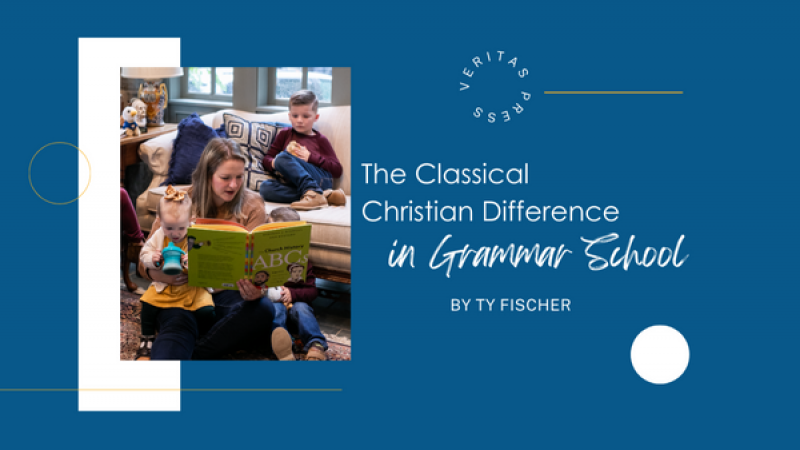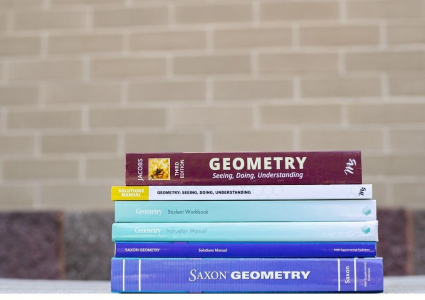The Classical Christian Difference in Grammar School

Editor’s note: If you’re new to classical education, the word “grammar” may make you think of English class. But in classical education, “Grammar School” refers to students who are in grades k-6.
The same or similar? Many times this question matters little. Most generic drugs are so similar to name-brand that the cost difference makes a difference. At other points, however, similar end up being frustratingly unacceptable.
Technology amazes me, but I once had a problem synchronizing the reminders function between my phone and my computer. The lists were similar. They weren’t the same. Tasks would not move from one device to another, or a small number of reminders would just disappear mysteriously. This led to a feeling of dread, which I called professional vertigo. I was never quite sure that I wasn’t missing something. It was awful. Sometimes similar and the same are drastically different.
Often, when families come on tours of our secondary school, they immediately see the differences between classical Christian education (CCE) and traditional education. The differences are not complete, but some are hard to miss.
The names of the classes are different.
Parents won’t find Logic, Rhetoric, and Senior Thesis on the class list at a public school.
The curriculum might look pretty different too. Students might be reading The Divine Comedy or Thucydides.
The class environment will be strikingly different as well. Students might be in the midst of a discussion where the students are speaking more than the teacher. The teacher might sometimes feel more like a referee.
It is easy to see the Classical Christian difference in the upper years.
In grammar school, however, many parents might miss the differences. They might come away from a grammar school tour thinking that what they witnessed is similar to what one might find in a traditional Christian school or even a well-run public school.
So, is grammar school similar or the same as a traditional education? In this post, I want to dig into the subtle yet critical differences between Classical Christian Education and all other forms of traditional education in the grammar school years. This does not deny that some of what we see in good teaching in a conventional school is good teaching in a classical Christian school. Still, there are massive differences that tend to have a significant impact. Here are the top three:
1. Focus on the Foundation and Deep Competence
Classical Christian schools are approaching the task of grammar school from a different perspective than other educational traditions. We are building a foundation and forming loves. Grammar school is joyful, rigorous, and perfecting some skills that will serve these students well in life and enable them to grow much faster and straighter in secondary school.
The Classical tradition even had a different name for the grammar school teacher: Grammaticus. The main focus was on reading and Latin grammar. This part of education was more like building muscle through memorization and exercise. It was a little like slavery. In the ancient world, the most competent people in many tasks were slaves. They were forced to practice their tasks all the time, whether in math, training horses, or harvesting grain.
Citizens needed to have skills like reading and math, but they were then going to devote themselves to things like Logic and Rhetoric—skills that enabled them to lead society. In the ancient world, the Grammaticus could be a fearful person. He was responsible for making sure the foundation was present. If it was lacking, the youth often became useless and profligate. Diogenes the Cynic reportedly said, “Seeing an ill-bred youth, I struck his tutor exclaiming, ‘Who made him thus?’” Yikes.
Thankfully, today’s classical Christian schools build that foundation rigorously and joyfully. These foundational skills of language, both English and Latin, and the foundational skills of math are the focus. As they learn, these students become competent at an excellent level. For many, math and reading become joyful skills.
Recently, my wife received a picture of a church bulletin from one of her 4th-grade student’s mother. There were math problems all over the bulletin. The child delighted in the new math concept and started creating and solving her own problems. The mom wanted more focus on the sermon but was amazed that her child enjoyed doing this.
Too often, traditional schools drink in some of our culture's bad ideas about children. They ask grammar school kids to reason and demonstrate creativity when they should be teaching them how to imitate and become deeply skilled and competent.
2. Deep Competence that Shows Itself in Automatic and Precise Knowledge
Grammar students at classical Christian schools often become amazingly automatic and deeply precise. We often use grammar school students to settle disputes. Did Constantinople fall in 1453 or 1543? A grammar school student will know.
Because of classical Christian schools' devotion toward foundational skills, their competency increasingly appears to be something like magic to non-classical Christian folk. Here are a few of my favorite anecdotes:
My third daughter, Karis, was working locally on the catering staff of a facility that hosted banquets and weddings. She was one of the youngest workers, but when the boss asked, “We have a banquet for 85. That box has 75 glasses, and this box has 15 glasses. I wonder if we have enough glasses?” Karis answered, “Yes. 75+15 is 90, and that is five more than needed,” The boss said, “How do you know?” Karis, a bit confused, said, “I do math in my head.” The boss pulled out her phone and did the math. That day Karis received the nickname “4.0”.
A local friend of CCE was talking with a very young student at church. This student, Timothy, was from a Christian family that fled persecution in Myanmar, so English was not his first language. The older man asked the 2nd grader, “Timothy, what is 8 times 7?” Timothy immediately shot back, “56”.
On a tour once, a family was watching an upper grammar school class taking sentences apart using Shirley Grammar’s Question-Answer Flow. After the sentence was finished, one of the fathers erupted, “This is a setup. You taught them this sentence to show off on the tour.” I decided to take a risk, “Sir, please make up a sentence of your own.” I wrote it up on the board as he dictated. The class took that sentence apart just as easily. He was dumbstruck.
CCCE students, with a focus on the foundation, should be automatic and precise with their knowledge.
3. Stirring Deep Loves and Wonder
Grammar school students like to run. They are often running not because they are racing or someone is chasing them but because they can and because it is fun. They are a picture of Lewis’s “further up and further in.” I watch for this sort of joy seeping out of our grammar school students.
John Milton Gregory, in The Seven Laws of Teaching, recommends that teachers look to move their students into a state of secondary passive attention. This is a state of complete wonder and engagement. CCE aims for this sort of wonder. I see it almost every day. This is where field trips, gatherings, and activities make so much of a difference.
My wife’s favorite book that she teaches is Rolf and the Viking Bow. If she misses a day of class, she tries to ensure her substitutes don’t teach Rolf. She wants all of it. A few weeks ago, she mentioned a student who had struggled in past years, sitting in stunned silence as their daily reading ended. She mumbled, “This is my favorite book ever.”
Love and wonder are the gasolene that moves classical Christian schools forward. Dante would say this is because the love of God moves “the Sun and the other stars.”
A grammar school in a classical Christian school or homeschool might look similar to a traditional public school, but the CCE philosophy, the commitment to deep competency, and the commitment to stirring the love of students toward the true, good, and beautiful sets CCE apart. It might look similar, but the surface likeness gives way to vast differences in outcome and method.






